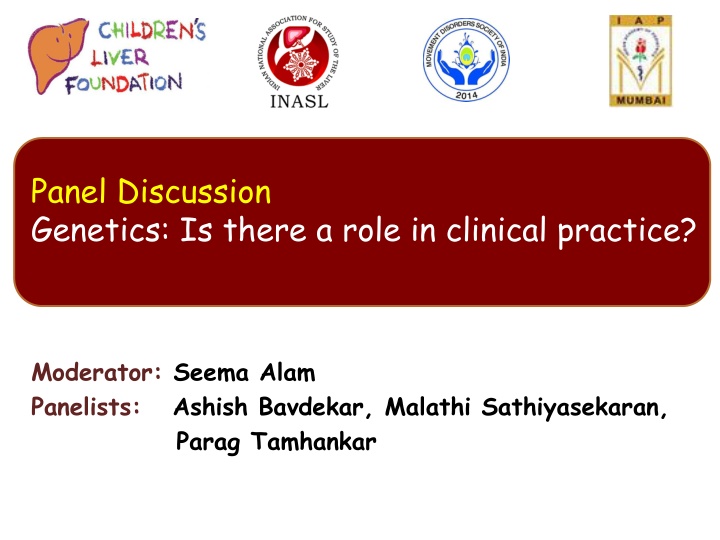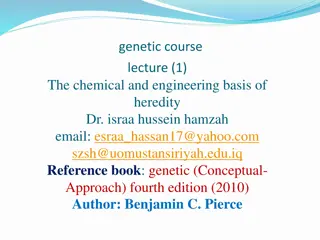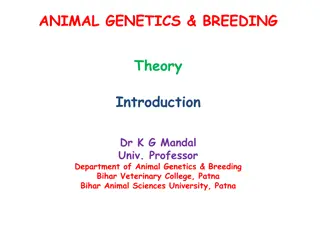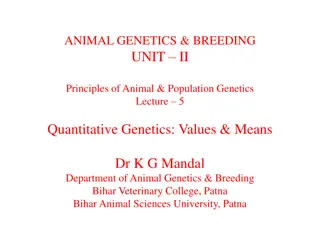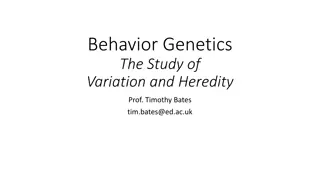Genetics in Clinical Practice Panel Discussion
The role of genetics in clinical practice through panel discussions on Wilson Disease cases and the importance of genetic testing for diagnosis and screening. Genetic analysis nuances and implications are discussed in detail.
Download Presentation

Please find below an Image/Link to download the presentation.
The content on the website is provided AS IS for your information and personal use only. It may not be sold, licensed, or shared on other websites without obtaining consent from the author.If you encounter any issues during the download, it is possible that the publisher has removed the file from their server.
You are allowed to download the files provided on this website for personal or commercial use, subject to the condition that they are used lawfully. All files are the property of their respective owners.
The content on the website is provided AS IS for your information and personal use only. It may not be sold, licensed, or shared on other websites without obtaining consent from the author.
E N D
Presentation Transcript
Panel Discussion Genetics: Is there a role in clinical practice? Moderator: Seema Alam Panelists: Ashish Bavdekar, Malathi Sathiyasekaran, Parag Tamhankar
Role of Genetic Testing in Wilson Disease
7 year old boy Chronic hepatitis Investigations Ceruloplasmin 4mg/dl 24 hour urinary copper 458 mcg/day, KF Ring positive Diagnosis: Wilsons disease Is genetic analysis needed???
Is genetic analysis needed??? As per AASLD 2009 guidelines, diagnosis of WD is confirmed in this child Genetic test will not aid any further for this child
Same child - 5 common mutations negative Is it not Wilson Disease ???
Is it not Wilson Disease ??? >500 ATP7B mutations - reported in WD Apart from mutations in the exons, mutations in regulatory elements as well A NEGATIVE GENETIC TEST DOES NOT RULE OUT WD Indian J Gastroenterol (November December 2012)
10 year Boy - Acute-on-chronic liver failure Acute: Hepatitis E Chronic: Wilson Disease Coombs ve hemolysis Grade 3 Hepatic Encephalopathy PELD: 27, NWI: 16 Diagnosis: Acute Fulminant Wilson Disease Role of genetics in such a scenario??
Role of genetics in such a scenario?? Important for the screening of other family members If mutation not possible or no known mutation detected Preserve DNA of the patient for linkage/haplotype analysis
Asymptomatic 4 year old Sibling of Wilson disease Liver Function tests , USG normal Ceruloplasmin: 18 mg/dl 24 hour urinary copper: 40 mcg/day No K-F ring Would genetic testing help in diagnosis??
Genetic testing method of choice for screening in first degree family relatives If mutation for proband is positive, direct gene testing in famliy If mutation is negative or unknown then haplotype analysis AASLD Class I, Level B
8 year old female Chronic hepatitis Investigations Ceruloplasmin 7mg/dl 24 hour urinary copper 228 mcg/day, KF Ring negative Diagnosis: Suspected Wilsons disease Does genetic analysis obviate the need for liver biopsy??
Genetic testing is not cost effective Liver biopsy - provides additional information about the liver status Genetic testing maybe offered in inconclusive report
10 year old diagnosed as Wilson Disease Mutation detected Asymptomatic sibling Same homozygous mutation present and started on chelation Biochemical tests not done Is it appropriate to start treatment on the basis of just presence of genetic mutations without evidence of abnormal biochemical parameters?
Biochemical tests v/s Genetic Studies Biochemical tests help in diagnosis as well as monitoring patients on treatment Biochemical tests cannot be replaced by genetic studies. Phenotypic and genotypic heterogeneity is known with Wilson Disease Not enough data to prove genotype phenotype correlation
Master S / 7 year / Boy Acute Fulminant Wilson Disease PELD- 30, NWI 12 Planned for liver transplant Probable donors- 18 year old elder sibling Parent What is the role of genetic studies in donor evaluation for Liver Transplant?
Role of Genetic testing in donor evaluation In the 18 year old sibling: Genetic mutations may be helpful in patients with low normal ceruloplasmin levels and normal phenotype Genetic tests would help to identify specific gene mutations (homozygous/ heterozygous) In the asymptomatic parent: Identify homozygous and heterozygous mutation DNA linkage analysis and haplotype studies in places where direct gene studies are not available.
25 year old Chronic Liver Disease - Wilson Disease Compliant to diet and treatment Plans to start a family What genetic counseling would you give to this patient? Is prenatal diagnosis possible?
Autosomal Recessive In a consanguineous marriage: Both parents heterozygous: 25% affected & 50% would be carriers. One parent diseased and the other is heterozygous: 50% affected Asymptomatic partner can be heterozygous for the mutation. Genetic testing should be advised. Prenatal diagnosis can help in early diagnosis and treatment with good long term outcome.
15 year old boy Neurological Wilson Disease oRole of genetic testing in Neurological Wilson Disease?? oAny specific gene mutation associated with Neurological Wilson Disease??
Genotype- Phenotype correlation Correlation with age and neurological presentation NO correlation with age and neurological presentation
Indian mutations in Wilson Disease Different centers screen for different allele panels No consistent results from the available studies Large population with genetic heterogeneity High rates of consanguineous marriages in some parts of the country No caste based/ community based studies to identify common mutations in a Aggarwal A, et al. Ann Hum Genet. 2010 particular group.
Study Place Sample size Common mutation Phenotype S. Mukherjee Kolkota and Pune 199 p.C271X (24%) p.G1101R (23%) Aggarwal A Mumbai 53 p.C271X (20.2%) p.E122fs (10.6%) Hepatic: 30% Neuro: 66% Kumar S. Chandigarh 41 T33053 (6 %) C2975A (6 %) 2977insA (6 %) Hepatic: 60% Neuro: 21% Gupta A. Kolkota 62 C813A (19 %) Santhosh S. Vellore 27 G3182A (16 %) C813A (12 %) @ ILBS New Delhi 16 G3182A (50%) C813A (30%) Hepatic : 11/16 Neuro: 01/03
Key Messages Definite role of genetic studies especially with negative/ inconclusive biochemical tests. Screening for genetic mutations is more effective with known mutation in the proband. Genotype Phenotype correlation is not consistent Lack of consistent data for mutations in India due to no uniformity in allele testing.
